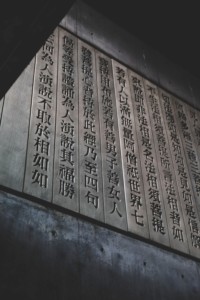
There are two main reasons why feng shui terms are so cryptic and misunderstood. One reason is that feng shui masters from the past purposely coded their references so that the average person (or the political enemy) would not have privy to this powerful information. The other reason is less sinister: much can get lost in literal translation from an ancient and superstitious culture.
The Death Position: Pop feng Shui books still refer to an undesirable sleeping position with this ominous implication. It refers to someone who sleeps in a direction that isn’t favorable to him or her, based on their birth year and it can also refer to someone who sleeps directly aligned with a doorway. Neither of these situations causes death. But they do put a person in a position that can undermine their health over a long period of time because the body itself is not in a good alignment with the air currents of the room.
Dragon Mountains: Some people actually think that a mountain is supposed to always look like the rippling back of a dragon. Actually, the feng shui dragon is a mythical creature that is a composite of several real animals. It has the body of a snake, the head is like a horse, with wings like a bird. It is considered a powerful and lucky creature. So a mountain that is referred to as a Dragon Mountain is said to be full of life. Compare a beautiful rolling mountain range, green all over and full of wildlife in contrast to the hard desolate, lifeless mountains we see in the desert. And to make it even more complicated, a “Dragon Mountain” should not be confused with a “mountain dragon” which is a reference to certain stars in a “Flying Star Chart.”
Evil Spirits: This term is still sometimes used to describe anything that may have negative energy or consequences, but sounds both primitive and superstitious. One time my electrician discovered a high electromagnetic field in one room of the house. Studies are showing that high EMFs can contribute to health problems, especially in children. If he had turned to me to say that I had high levels of evil spirits emanating from the electrical panel, I would have questioned his sanity. But the term evil spirits or yin spirits is still accepted as a catch-all phrase for any kind of potential negative influences, and not the western connotation of ghosts or “satanic” forces.
Eight Celestial Mansions or Palaces: This is a very exotic way to talk about the 8 basic directions: north, south, east, west, northwest, southwest, northeast, southeast. Even today, a tiny apartment may be referred to as someone’s “mansion” and “palace” or a directional zone. The North “Palace” is the North sector of the floor plan.
Poison Arrows: This ominous term refers to the hard edges of a corner or a long uninterrupted line of air currents, such as an excessively long hallway or street. It has been used loosely to describe the small corners of furniture to the large angled corners of buildings. Like an arrow, it sends a direct line of air currents, considered harmful to health and well-being. This is definitely something to consider and avoid on a large scale, but the current panic over every little edge to a table or bookshelf is totally unnecessary.
Dragon, Tiger, Tortoise, Phoenix: These are code words for the size and height of nearby mountains, hills or even houses and buildings on any side of your property. Some heights are considered beneficial and others harmful, all in relation to the unique property being analyzed. As an example, if you have a one story house, sandwiched in between two very tall buildings, the “dragon” and “tiger” on each side would be considered too overwhelming with potential negative side effects. Not the least of which, the taller building could block natural light.
Peach Blossom: This poetic term refers to the delicate peach blossom flower, which gently falls from its branch and gets whisked away down the river. It implies a young woman whose heart can get broken in romance. It now refers to a man or woman who has a lot of sexual opportunities. A peach blossom “problem” can allude to an affair or sexual scandal. There is a popular feng shui application, which is referred to as Peach Blossom remedy and it includes using a vase of flowers in a certain part of the house to help stimulate romantic attraction. This sometimes effective remedy has been diluted into people thinking that hanging a picture of peach blossoms will bring them romance.
Flying Star School: Sounding very magical, this branch of classical feng shui uses of the Chinese Feng Shui compass (lo-pan), for calculating the energies both inside and approaching a structure. It is based on when the structure was built as well as the changing annual, monthly, and daily influences.
Author: Kartar Diamond
Company: Feng Shui Solutions ®
From the Feng Shui Theory Blog Series

